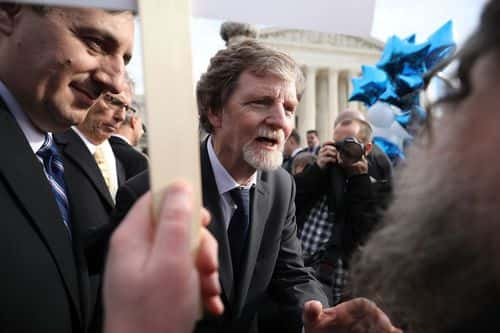Jack Phillips: Baker challenges court ruling penalizing him for refusal to make 'gender transition' cake

DENVER, COLORADO: A Colorado baker, who won a partial Supreme Court victory after refusing to make a wedding cake for a gay couple on religious grounds a decade ago, is now challenging another separate ruling stating that he violated the state's anti-discrimination law by refusing to make a "gender transition" cake.
A lawyer for baker Jack Phillips on Wednesday challenged Colorado’s appeal court, to overturn the court’s last year’s ruling in a lawsuit bought by a transgender woman customer of the Baker.
READ MORE
Colorado baker who turned away gay couple wins Supreme Court battle
The case started when a transgender woman identified as Autumn Scardina called Phillips’ cake shop in Denver, Colorado in 2017, to place an order for a cake with blue frosting on the outside and pink filling inside to celebrate her gender transition. But Philips, who is a Christian, testified in a court hearing last year that he did not think someone could alter their gender and he would not "celebrate somebody who thinks that they can.”
Denver district judge A Bruce Jones made a ruling in June 2021 in which he stated that Philips’ decision of refusing to make a gender transition cake for Scardina is a violation of the state’s anti-discrimination law and fined him $500 — the maximum penalty under Colorado's Anti-Discrimination Act. "The anti-discrimination laws are intended to ensure that members of our society who have historically been treated unfairly are no longer treated as ''others''," Jones wrote.

But now, Jake Warner, an attorney representing Phillips from the conservative Christian legal advocacy group Alliance Defending Freedom, challenged the ruling and said it was wrong. Urging the court to overturn the ruling, Warner noted that forcing Philips to bake a cake portraying a message contradictory to his beliefs is violating his right to free speech.
Judge Timothy Schutz noted Philips’ wife had accepted Scardina’s order before she described the details and significance of the cake. John McHugh, an attorney for Scardina said she did not ask the baker to promote her idea, she just asked him to bake a cake for her just like they do for their other customers. McHugh added that the case is not about what happened with Scardina but it is about how people from the LGBTQ+ community are treated. "This is about a business that is open to the public that simply says to an entire class of people in the community that your identity, who you are, is objectional," he said.
Scardina, an attorney, testified she intentionally ordered a cake on the same day in 2017 that the Supreme Court announced it would hear Phillips’ appeal in the wedding cake case, just to challenge Philips’ statement that he can serve people from the LGBTQ community. Before filing a law suit against Philips, Scardina first filed a complaint against Phillips with the state and the civil rights commission, which found that Philips has discriminated against her. Challenging her complaint, Philips then filed a lawsuit against Colorado accusing it of a “crusade to crush” him by pursuing the complaint.
However, this is not the first time that Philips has challenged a court ruling. Before this challenge, Philips won a case in the US Supreme Court in 2018 after refusing to bake a cake for a gay couple. In 2018, the Supreme Court ruled that the Colorado Civil Rights Commission had acted with anti-religious bias in enforcing the anti-discrimination law against Phillips after he refused to bake a cake celebrating the wedding of Charlie Craig and Dave Mullins in 2012.










